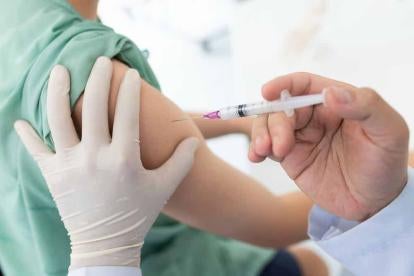The Fair Labor Standards Act (FLSA) requires employers to pay nonexempt employees at least minimum wage for all hours worked up to 40 hours in a workweek and time and one-half for all hours worked over 40 hours in the same workweek. An exception to this rule exists for volunteers, who are not categorized as “employees” under the statute. Typically, volunteers are individuals who donate their time to non-profit, civic, religious, and other charitable organizations.
In light of the COVID-19 pandemic and the urgency to administer vaccines as quickly as possible, hospitals and healthcare facilities are relying on volunteers to assist in organizing vaccine distribution. Employers may want to review their program to ensure volunteers are donating their time in a way that does not run afoul of the FLSA.
Unfortunately, no bright-line rule exists to determine whether an individual is volunteering his or her time or performing compensable work under the FLSA. Instead, this determination hinges, in large part, on the type of work performed by the individual.
If an individual is performing service that relates to commercial activities, he or she will likely be considered an employee under the FLSA, and therefore entitled to wages. For example, an individual who “volunteers” his or her time working at the hospital gift shop may be entitled to compensation under the FLSA. Further, if a volunteer performs tasks on a full-time schedule, is retained for an indefinite period, or displaces a regular employee, it is likely the FLSA would categorize this individual as an employee who should be paid wages for all hours worked.
Recently, some hospitals have been faced with situations in which employees offered to volunteer their time after their shifts to perform the same types of services they are otherwise employed to provide. For example, a nurse employed at a hospital to administer the COVID-19 vaccine to patients during her regular working hours may volunteer to continue vaccinating patients after her assigned shift. Because this is likely impermissible “volunteer” work under the FLSA, the nurse may be entitled to compensation for any hours worked after her shift.
Another similar situation would be when a retired nurse wants to assist with clinical aspects or vaccine administration on a volunteer basis. For the same reasons noted above, this may also be problematic. Employers may want to review each situation on a case-by-case basis and proceed with caution. At a minimum, the employer may want to consider the below recommendations before classifying the returning nurse as a volunteer—who will likely be working alongside paid employees performing the same tasks.
So how can hospitals and similar facilities potentially use volunteers? Some ideas that may be permissible under the FLSA include: organizing the hospital’s vaccine distribution process, including ensuring patients waiting for their vaccine are wearing masks and staying six-feet apart in a line (among other safety recommendations); helping with check-in and other administrative work; and answering questions from patients.
If permitting volunteer work, healthcare employers may want to consider asking volunteers to sign authorization or other written forms that acknowledge the volunteers are knowingly and willingly donating their time to specific tasks and that the duration of the work is temporary. This type of acknowledgment may help to verify that the volunteer and employer are aligned in terms of the work performed, their relative expectations, and the (lack of) compensation provided.
With hospitals and other healthcare distribution facilities maintaining a commitment to administer the vaccine as effectively and efficiently as possible, volunteers are a key part of this mission. Many roles may exist for volunteers that comply with the FLSA and applicable state laws. While employers may want to carefully consider each situation and take precautions, the additional assistance provided by volunteers may be worthwhile to service communities and provide a quick and seamless process to administer vaccinations. At the very least, employers may want to ensure that volunteers are receiving proper recognition and resources for their time, even if it is a simple “thank you.”





 />i
/>i

